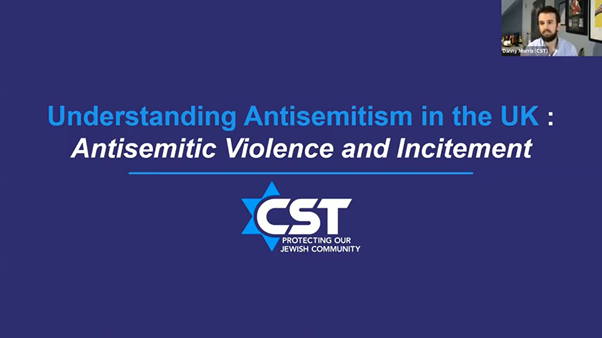I applied to take part in the ‘Understanding Antisemitism in the UK’ short course for Ambassadors because I wanted to learn more about antisemitism. This would enable me to more effectively share my knowledge on the contemporary relevance of the Holocaust and to better understand the experiences of the Jewish community. As a Politics student it was an opportunity I felt I couldn’t miss, especially following the increase of antisemitism within political culture, and I knew understanding the roots of injustices was crucial to combatting them.
The Sessions
The course was made up of four weeks of sessions which were a mixture of live sessions, recorded sessions and workshops. We started the course with an introduction session, led brilliantly by Jeremy Leigh (a lecturer at Hebrew Union College, Jerusalem). He explored Jewish identity, diasporas throughout time, and shared his experiences of living in both the UK and Israel.
Week One:
We tackled the definition of antisemitism, looking both at its roots and contemporary application (including the IHRA definition), and went further in-depth into historical antisemitism.
We heard a talk from Rabbi Baroness Julia Neuberger DBE, linking to her book ‘Antisemitism: What it is. What it isn’t. Why it Matters’. Then we learnt about both historical and contemporary issues and examples of antisemitism with Dr Robert Rozett from Yad Vashem, Danny Stone MBE from the Antisemitism Policy Trust and Lord John Mann!
These sessions were a great way to help us better understand the origins of antisemitism. I personally found it shocking to learn that the blood libel conspiracy theory originated in the UK. The blood libel was used to justify the murder of Jews as far back as Medieval times and is a conspiracy still believed by some today. Understanding these roots of antisemitism helped clarify previous learning, and provided a solid basis to learn more.
 Baroness Neuberger speaking to us
Baroness Neuberger speaking to us
 Dr Robert Rozett from Yad Vashem speaking about Historical Antisemitsm
Dr Robert Rozett from Yad Vashem speaking about Historical Antisemitsm
Week Two:
We were joined by speakers from the Community Security Trust (CST), a charity that protects British Jews from antisemitism and related threats. They educated us on antisemitic violence and incitement, conspiracy theories, scapegoating and stereotyping, providing a very eye-opening account into some of the reasons people hold antisemitic views.
This week really built on week one and enabled us to have a much more rounded understanding, allowing us to see how some of these forms of hatred materialised.


CST sessions on Antisemitic Violence and Incitement and Conspiracy theories and Scapegoating
Weeks Three and Four:
We started with an engaging talk led by the Centre for Countering Digital Hate, focussing on radicalising spaces/platforms, trolling and combating online abuses.
The next two sessions were workshops from HOPE not Hate, exploring how to tell your story and how to navigate difficult conversations. These talks utilised breakout rooms for discussions and practicing skills, and were a great way to meet other ambassadors.
Throughout the course, we were given ample opportunities to share our own thoughts, and this was a great way to consider other viewpoints. The workshop sessions helped us express ourselves, as we completed several tasks in small groups, and really helped give the course a community feel. Everyone really enjoyed the opportunity to speak to other Ambassadors, and enjoyed the positive and inclusive community environment.
For the last session of the course, we were privileged to be joined by Lord Eric Pickles, with Karen Pollock CBE (The Trust’s own Chief executive) leading the discussion. It was a great way to conclude the course, with many Ambassadors having the opportunity to have their questions answered.

Lord Pickles answering questions (his background is the rendering of the proposed Holocaust Memorial and Learning Centre in Victoria Tower Gardens)
I’d like to say a massive thank you to the amazing Holocaust Educational Trust team and all the speakers involved who made this course so great. Thank you also to every Ambassador involved for your inspirational passion and effort. The course taught us all so much, as you can see from a snippet of the feedback below.
“After each of the talks, I really enjoyed looking at my notes and doing further research of my own - all of the speakers gave such great insight into the realities of Jewish life today and I am really grateful for such a varied education from the course.”
“I have really enjoyed talking with the other ambassadors and the community feeling that HET has helped to bring between us. I loved discussing different opinions and ideas as well as gaining valued knowledge from those running the sessions.”
“The sessions really opened my eyes to forms of antisemitism I didn't know existed, and I feel genuinely well equipped to stand up for the Jewish community both online and on the streets.”
I would definitely recommend getting involved in any upcoming opportunities, as they are a brilliant way to learn more, develop your abilities, and to meet other Ambassadors like yourself. If you would like to get involved by writing for the newsletter or in any way at all, please email This email address is being protected from spambots. You need JavaScript enabled to view it..
